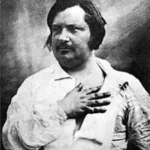 | |
Bertha the Penitent | |
| Author | Honore de Balzac |
|---|---|
| Published |
1820
|
| Language | English |
| Original Language | French |
| Nationality | French |
| Genre | French Literature, Realism |
1820 Short Story
Bertha the Penitent
Bertha the Penitent is an English French Literature, Realism short story by French writer Honore de Balzac. It was first published in 1820.
Bertha the Penitent
by Honore de Balzac
I. How Bertha Remained a Maiden in the Married State
About the time of the first flight of the Dauphin, which threw our good Sire, Charles the Victorious, into a state of great dejection, there happened a great misfortune to a noble House of Touraine, since extinct in every branch; and it is owing to this fact that this most deplorable history may now be safely brought to light. To aid him in this work the author calls to his assistance the holy confessors, martyrs, and other celestial dominations, who, by the commandments of God, were the promoters of good in this affair.
From some defect in his character, the Sire Imbert de Bastarnay, one of the most landed lords in our land of Touraine, had no confidence in the mind of the female of man, whom he considered much too animated, on account of her numerous vagaries, and it may be he was right. In consequence of this idea he reached his old age without a companion, which was certainly not to his advantage. Always leading a solitary life, this said man had no idea of making himself agreeable to others, having only been mixed up with wars and the orgies of bachelors, with whom he did not put himself out of the way. Thus he remained stale in his garments, sweaty in his accoutrements, with dirty hands and an apish face. In short, he looked the ugliest man in Christendom. As far as regards his person only though, since so far as his heart, his head, and other secret places were concerned, he had properties which rendered him most praiseworthy. An angel (pray believe this) would have walked a long way without meeting an old warrior firmer at his post, a lord with more spotless scutcheon, of shorter speech, and more perfect loyalty.
Certain people have stated, they have heard that he gave sound advice, and was a good and profitable man to consult. Was it not a strange freak on the part of God, who plays sometimes jokes on us, to have granted so many perfections to a man so badly apparelled?
When he was sixty in appearance, although only fifty in years, he determined to take unto himself a wife, in order to obtain lineage. Then, while foraging about for a place where he might be able to find a lady to his liking, he heard much vaunted, the great merits and perfections of a daughter of the illustrious house of Rohan, which at that time had some property in the province. The young lady in question was called Bertha, that being her pet name. Imbert having been to see her at the castle of Montbazon, was, in consequence of the prettiness and innocent virtue of the said Bertha de Rohan, seized with so great a desire to possess her, that he determined to make her his wife, believing that never could a girl of such lofty descent fail in her duty. This marriage was soon celebrated, because the Sire de Rohan had seven daughters, and hardly knew how to provide for them all, at a time when people were just recovering from the late wars, and patching up their unsettled affairs. Now the good man Bastarnay happily found Bertha really a maiden, which fact bore witness to her proper bringing up and perfect maternal correction. So immediately the night arrived when it should be lawful for him to embrace her, he got her with a child so roughly that he had proof of the result two months after marriage, which rendered the Sire Imbert joyful to a degree. In order that we may here finish with this portion of the story, let us at once state that from this legitimate grain was born the Sire de Bastarnay, who was Duke by the grace of Louis the Eleventh, his chamberlain, and more than that, his ambassador in the countries of Europe, and well-beloved of this most redoubtable lord, to whom he was never faithless. His loyalty was an heritage from his father, who from his early youth was much attached to the Dauphin, whose fortunes he followed, even in the rebellions, since he was a man to put Christ on the cross again if it had been required by him to do so, which is the flower of friendship rarely to be found encompassing princes and great people. At first, the fair lady of Bastarnay comported herself so loyally that her society caused those thick vapours and black clouds to vanish, which obscured the mind of this great man, the brightness of the feminine glory. Now, according to the custom of unbelievers, he passed from suspicion to confidence so thoroughly, that he yielded up the government of his house to the said Bertha, made her mistress of his deeds and actions, queen of his honour, guardian of his grey hairs, and would have slaughtered without a contest any one who had said an evil word concerning this mirror of virtue, on whom no breath had fallen save the breath issued from his conjugal and marital lips, cold and withered as they were. To speak truly on all points, it should be explained, that to this virtuous behaviour considerably aided the little boy, who during six years occupied day and night the attention of his pretty mother, who first nourished him with her milk, and made of him a lover’s lieutenant, yielding to him her sweet breasts, which he gnawed at, hungry, as often as he would, and was, like a lover, always there. This good mother knew no other pleasures than those of his rosy lips, had no other caresses that those of his tiny little hands, which ran about her like the feet of playful mice, read no other book than that in his clear baby eyes, in which the blue sky was reflected, and listened to no other music than his cries, which sounded in her ears as angels’ whispers. You may be sure that she was always fondling him, had a desire to kiss him at dawn of day, kissed him in the evening, would rise in the night to eat him up with kisses, made herself a child as he was a child, educated him in the perfect religion of maternity; finally, behaved as the best and happiest mother that ever lived, without disparagement to our Lady the Virgin, who could have had little trouble in bringing up our Saviour, since he was God.
This employment and the little taste which Bertha had for the blisses of matrimony much delighted the old man, since he would have been unable to return the affection of a too amorous wife, and desired to practice economy, to have the wherewithal for a second child.
After six years had passed away, the mother was compelled to give her son into the hands of the grooms and other persons to whom Messire de Bastarnay committed the task to mould him properly, in order that his heir should have an heritage of the virtues, qualities and courage of the house, as well as the domains and the name. Then did Bertha shed many tears, her happiness being gone. For the great heart of this mother it was nothing to have this well-beloved son after others, and during only certain short fleeting hours. Therefore she became sad and melancholy. Noticing her grief, the good man wished to bestow upon her another child and could not, and the poor lady was displeased thereat, because she declared that the making of a child wearied her much and cost her dear. And this is true, or no doctrine is true, and you must burn the Gospels as a pack of stories if you have not faith in this innocent remark.
This, nevertheless, to certain ladies (I did not mention men, since they have a smattering of the science), will still seem an untruth. The writer has taken care here to give the mute reasons for this strange antipathy; I mean the distastes of Bertha, because I love the ladies above all things, knowing that for want of the pleasure of love, my face would grow old and my heart torment me. Did you ever meet a scribe so complacent and so fond of the ladies as I am? No; of course not. Therefore, do I love them devotedly, but not so often as I could wish, since I have oftener in my hands my goose-quill than I have the barbs with which one tickles their lips to make them laugh and be merry in all innocence. I understand them, and in this way.
The good man Bastarnay was not a smart young fellow of an amorous nature, and acquainted with the pranks of the thing. He did not trouble himself much about the fashion in which he killed a soldier so long as he killed him; that he would have killed him in all ways without saying a word in battle, is, of course, understood. The perfect heedlessness in the matter of death was in accordance with the nonchalance in the matter of life, the birth and manner of begetting a child, and the ceremonies thereto appertaining. The good sire was ignorant of the many litigious, dilatory, interlocutory and proprietary exploits and the little humourings of the little fagots placed in the oven to heat it; of the sweet perfumed branches gathered little by little in the forests of love, fondlings, coddlings, huggings, nursing, the bites at the cherry, the cat-licking, and other little tricks and traffic of love which ruffians know, which lovers preserve, and which the ladies love better than their salvation, because there is more of the cat than the woman in them. This shines forth in perfect evidence in their feminine ways. If you think it worth while watching them, examine them attentively while they eat: not one of them (I am speaking of women, noble and well-educated) puts her knife in the eatables and thrusts it into her mouth, as do brutally the males; no, they turn over their food, pick the pieces that please them as they would gray peas in a dovecote; they suck the sauces by mouthfuls; play with their knife and spoon as if they are only ate in consequence of a judge’s order, so much do they dislike to go straight to the point, and make free use of variations, finesse, and little tricks in everything, which is the especial attribute of these creatures, and the reason that the sons of Adam delight in them, since they do everything differently to themselves, and they do well. You think so too. Good! I love you.
Now then, Imbert de Bastarnay, an old soldier, ignorant of the tricks of love, entered into the sweet garden of Venus as he would into a place taken by assault, without giving any heed to the cries of the poor inhabitants in tears, and placed a child as he would an arrow in the dark. Although the gentle Bertha was not used to such treatment (poor child, she was but fifteen), she believed in her virgin faith, that the happiness of becoming a mother demanded this terrible, dreadful bruising and nasty business; so during his painful task she would pray to God to assist her, and recite /Aves/ to our Lady, esteeming her lucky, in only having the Holy Ghost to endure. By this means, never having experienced anything but pain in marriage, she never troubled her husband to go through the ceremony again. Now seeing that the old fellow was scarcely equal to it–as has been before stated–she lived in perfect solitude, like a nun. She hated the society of men, and never suspected that the Author of the world had put so much joy in that from which she had only received infinite misery. But she loved all the more her little one, who had cost her so much before he was born. Do not be astonished, therefore, that she held aloof from that gallant tourney in which it is the mare who governs her cavalier, guides him, fatigues him, and abuses him, if he stumbles. This is the true history of certain unhappy unions, according to the statement of the old men and women, and the certain reason of the follies committed by certain women, who too late perceive, I know not how, that they have been deceived, and attempt to crowd into a day more time than it will hold, to have their proper share of life. That is philosophical, my friends. Therefore study well this page, in order that you may wisely look to the proper government of your wives, your sweethearts, and all females generally, and particularly those who by chance may be under your care, from which God preserve you.
Thus a virgin in deed, although a mother, Bertha was in her one-and- twentieth year a castle flower, the glory of her good man, and the honour of the province. The said Bastarnay took great pleasure in beholding this child come, go, and frisk about like a willow-switch, as lively as an eel, as innocent as her little one, and still most sensible and of sound understanding; so much so that he never undertook any project without consulting her about it, seeing that if the minds of these angels have not been disturbed in their purity, they give a sound answer to everything one asks of them. At this time Bertha lived near the town of Loches, in the castle of her lord, and there resided, with no desire to do anything but look after her household duties, after the old custom of the good housewives, from which the ladies of France were led away when Queen Catherine and the Italians came with their balls and merry-makings. To these practices Francis the First and his successors, whose easy ways did as much harm to the State of France as the goings on of the Protestants lent their aid. This, however, has nothing to do with my story.
About this time the lord and lady of Bastarnay were invited by the king to come to his town of Loches, where for the present he was with his court, in which the beauty of the lady of Bastarnay had made a great noise. Bertha came to Loches, received many kind praises from the king, was the centre of the homage of all the young nobles, who feasted their eyes on this apple of love, and of the old ones, who warmed themselves at this sun. But you may be sure that all of them, old and young, would have suffered death a thousand times over to have at their service this instrument of joy, which dazzled their eyes and muddled their brains. Bertha was more talked about in Loches then either God or the Gospels, which enraged a great many ladies who were not so bountifully endowed with charms, and would have given all that was left of their honour to have sent back to her castle this fair gatherer of smiles.
A young lady having early perceived that one of her lovers was smitten with Bertha, took such a hatred to her that from it arose all the misfortunes of the lady of Bastarnay; but also from the same source came her happiness, and her discovery of the gentle land of love, of which she was ignorant. This wicked lady had a relation who had confessed to her, directly he saw Bertha, that to be her lover he would be willing to die after a month’s happiness with her. Bear in mind that this cousin was as handsome as a girl is beautiful, had no hair on his chin, would have gained his enemy’s forgiveness by asking for it, so melodious was his young voice, and was scarcely twenty years of age.
“Dear cousin,” said she to him, “leave the room, and go to your house; I will endeavour to give you this joy. But do not let yourself be seen by her, nor by that old baboon-face by an error of nature on a Christian’s body, and to whom belongs this beauteous fay.”
The young gentleman out of the way, the lady came rubbing her treacherous nose against Bertha’s, and called her “My friend, my treasure, my star of beauty”; trying every way to be agreeable to her, to make her vengeance more certain on the poor child who, all unwittingly, had caused her lover’s heart to be faithless, which, for women ambitious in love, is the worst of infidelities. After a little conversation, the plotting lady suspected that poor Bertha was a maiden in matters of love, when she saw her eyes full of limpid water, no marks on the temples, no little black speck on the point of her little nose, white as snow, where usually the marks of the amusement are visible, no wrinkle on her brow; in short, no habit of pleasure apparent on her face–clear as the face of an innocent maiden. Then this traitress put certain women’s questions to her, and was perfectly assured by the replies of Bertha, that if she had had the profit of being a mother, the pleasures of love had been denied to her. At this she rejoiced greatly on her cousin’s behalf–like the good woman she was.
Then she told her, that in the town of Loches there lived a young and noble lady, of the family of a Rohan, who at that time had need of the assistance of a lady of position to be reconciled with the Sire Louis de Rohan; that if she had as much goodness as God had given her beauty, she would take her with her to the castle, ascertain for herself the sanctity of her life, and bring about a reconciliation with the Sire de Rohan, who refused to receive her. To this Bertha consented without hesitation, because the misfortunes of this girl were known to her, but not the poor young lady herself, whose name was Sylvia, and whom she had believed to be in a foreign land.
It is here necessary to state why the king had given this invitation to the Sire de Bastarnay. He had a suspicion of the first flight of his son the Dauphin into Burgundy, and wished to deprive him of so good a counsellor as was the said Bastarnay. But the veteran, faithful to young Louis, had already, without saying a word, made up his mind. Therefore he took Bertha back to his castle; but before they set out she told him she had taken a companion and introduced her to him. It was the young lord, disguised as a girl, with the assistance of his cousin, who was jealous of Bertha, and annoyed at her virtue. Imbert drew back a little when he learned that it was Sylvia de Rohan, but was also much affected at the kindness of Bertha, whom he thanked for her attempt to bring a little wandering lamb back to the fold. He made much of his wife, when his last night at home came, left men-at-arms about his castle, and then set out with the Dauphin for Burgundy, having a cruel enemy in his bosom without suspecting it. The face of the young lad was unknown to him, because he was a young page come to see the king’s court, and who had been brought up by the Cardinal Dunois, in whose service he was a knight-bachelor.
The old lord, believing that he was a girl, thought him very modest and timid, because the lad, doubting the language of his eyes, kept them always cast down; and when Bertha kissed him on the mouth, he trembled lest his petticoat might be indiscreet, and would walk away to the window, so fearful was he of being recognised as a man by Bastarnay, and killed before he had made love to the lady.
Therefore he was as joyful as any lover would have been in his place, when the portcullis was lowered, and the old lord galloped away across the country. He had been in such suspense that he made a vow to build a pillar at his own expense in the cathedral at Tours, because he had escaped the danger of his mad scheme. He gave, indeed, fifty gold marks to pay God for his delight. But by chance he had to pay for it over again to the devil, as it appears from the following facts if the tale pleases you well enough to induce you to follow the narrative, which will be succinct, as all good speeches should be.
II. How Bertha Behaved, Knowing the Business of Love
This bachelor was the young Sire Jehan de Sacchez, cousin of the Sieur de Montmorency, to whom, by the death of the said Jehan, the fiefs of Sacchez and other places would return, according to the deed of tenure. He was twenty years of age and glowed like a burning coal; therefore you may be sure that he had a hard job to get through the first day. While old Imbert was galloping across the fields, the two cousins perched themselves under the lantern of the portcullis, in order to keep him the longer in view, and waved him signals of farewells. When the clouds of dust raised by the heels of the horses were no longer visible upon the horizon, they came down and went into the great room of the castle.
“What shall we do, dear cousin?” said Bertha to the false Sylvia. “Do you like music? We will play together. Let us sing the lay of some sweet ancient bard. Eh? What do you say? Come to my organ; come along. As you love me, sing!”
Then she took Jehan by the hand and led him to the keyboard of the organ, at which the young fellow seated himself prettily, after the manner of women. “Ah! sweet coz,” cried Bertha, as soon as the first notes tried, the lad turned his head towards her, in order that they might sing together. “Ah! sweet coz you have a wonderful glance in your eye; you move I know not what in my heart.”
“Ah! cousin,” replied the false Sylvia, “that it is which has been my ruin. A sweet milord of the land across the sea told me so often that I had fine eyes, and kissed them so well, that I yielded, so much pleasure did I feel in letting them be kissed.”
“Cousin, does love then, commence in the eyes?”
“In them is the forge of Cupid’s bolts, my dear Bertha,” said the lover, casting fire and flame at her.
“Let us go on with our singing.”
They then sang, by Jehan’s desire, a lay of Christine de Pisan, every word of which breathed love.
“Ah! cousin, what a deep and powerful voice you have. It seems to pierce me.”
“Where?” said the impudent Sylvia.
“There,” replied Bertha, touching her little diaphragm, where the sounds of love are understood better than by the ears, but the diaphragm lies nearer the heart, and that which is undoubtedly the first brain, the second heart, and the third ear of the ladies. I say this, with all respect and with all honour, for physical reasons and for no others.
“Let us leave off singing,” said Bertha; “it has too great an effect upon me. Come to the window; we can do needlework until the evening.”
“Ah! dear cousin of my soul, I don’t know how to hold the needle in my fingers, having been accustomed, to my perdition to do something else with them.”
“Eh! what did you do then all day long?”
“Ah! I yielded to the current of love, which makes days seem Instants, months seem days, and years months; and if it could last, would gulp down eternity like a strawberry, seeing that it is all youth and fragrance, sweetness and endless joy.”
Then the youth dropped his beautiful eyelids over his eyes, and remained as melancholy as a poor lady who has been abandoned by her lover, who weeps for him, wishes to kiss him, and would pardon his perfidy, if he would but seek once again the sweet path to his once- loved fold.
“Cousin, does love blossom in the married state?”
“Oh no,” said Sylvia; “because in the married state everything is duty, but in love everything is done in perfect freedom of heart. This difference communicates an indescribable soft balm to those caresses which are the flowers of love.”
“Cousin, let us change the conversation; it affects me more than did the music.”
She called hastily to a servant to bring her boy to her, who came, and when Sylvia saw him, she exclaimed–
“Ah! the little dear, he is as beautiful as love.”
Then she kissed him heartily upon the forehead.
“Come, my little one,” said the mother, as the child clambered into her lap. “Thou art thy mother’s blessing, her unclouded joy, the delight of her every hour, her crown, her jewel, her own pure pearl, her spotless soul, her treasure, her morning and evening star, her only flame, and her heart’s darling. Give me thy hands, that I may eat them; give me thine ears, that I may bite them; give me thy head, that I may kiss thy curls. Be happy sweet flower of my body, that I may be happy too.”
“Ah! cousin,” said Sylvia, “you are speaking the language of love to him.”
“Love is a child then?”
“Yes, cousin; therefore the heathen always portrayed him as a little boy.”
And with many other remarks fertile in the imagery of love, the two pretty cousins amused themselves until supper time, playing with the child.
“Would you like to have another?” whispered Jehan, at an opportune moment, into his cousin’s ear, which he touched with his warm lips.
“Ah! Sylvia! for that I would ensure a hundred years of purgatory, if it would only please God to give me that joy. But in spite of the work, labour, and industry of my spouse, which causes me much pain, my waist does not vary in size. Alas! It is nothing to have but one child. If I hear the sound of a cry in the castle, my heart beats ready to burst. I fear man and beast alike for this innocent darling; I dread volts, passes, and manual exercises; in fact, I dread everything. I live not in myself, but in him alone. And, alas! I like to endure these miseries, because when I fidget, and tremble, it is a sign that my offspring is safe and sound. To be brief–for I am never weary of talking on this subject–I believe that my breath is in him, and not in myself.”
With these words she hugged him to her breasts, as only mothers know how to hug children, with a spiritual force that is felt only in their hearts. If you doubt this, watch a cat carrying her kittens in her mouth, not one of them gives a single mew. The youthful gallant, who had certain fears about watering this fair, unfertile plain, was reassured by this speech. He thought then that it would only be following the commandments of God to win this saint to love; and he thought right. At night Bertha asked her cousin–according to the old custom, to which the ladies of our day object–to keep her company in her big seigneurial bed. To which request Sylvia replied–in order to keep up the role of a well-born maiden–that nothing would give her greater pleasure. The curfew rang, and found the two cousins in a chamber richly ornamented with carpeting, fringes, and royal tapestries, and Bertha began gracefully to disarray herself, assisted by her women. You can imagine that her companion modestly declined their services, and told her cousin, with a little blush, that she was accustomed to undress herself ever since she had lost the services of her dearly beloved, who had put her out of conceit with feminine fingers by his gentle ways; that these preparations brought back the pretty speeches he used to make, and his merry pranks while playing the lady’s-maid; and that to her injury, the memory of all these things brought the water into her mouth.
This discourse considerably astonished the lady Bertha, who let her cousin say her prayers, and make other preparations for the night beneath the curtains of the bed, into which my lord, inflamed with desire, soon tumbled, happy at being able to catch an occasional glimpse of the wondrous charms of the chatelaine, which were in no way injured. Bertha, believing herself to be with an experienced girl, did not omit any of the usual practices; she washed her feet, not minding whether she raised them little or much, exposed her delicate little shoulders, and did as all the ladies do when they are retiring to rest. At last she came to bed, and settled herself comfortably in it, kissing her cousin on the lips, which she found remarkably warm.
“Are you unwell, Sylvia, that you burn so?” said she.
“I always burn like that when I go to bed,” replied her companion, “because at that time there comes back to my memory the pretty little tricks that he invented to please me, and which make me burn still more.”
“Ah! cousin, tell me all about this he. Tell all the sweets of love to me, who live beneath the shadow of a hoary head, of which the snows keep me from such warm feelings. Tell me all; you are cured. It will be a good warning to me, and then your misfortunes will have been a salutary lesson to two poor weak women.”
“I do not know I ought to obey you, sweet cousin,” said the youth.
“Tell me, why not?”
“Ah! deeds are better than words,” said the false maiden, heaving a deep sigh as the /ut/ of an organ. “But I am afraid that this milord has encumbered me with so much joy that you may get a little of it, which would be enough to give you a daughter, since the power of engendering is weakened in me.”
“But,” said Bertha, “between us, would it be a sin?”
“It would be, on the contrary, a joy both here and in heaven; the angels would shed their fragrance around you, and make sweet music in your ears.”
“Tell me quickly, then,” said Bertha.
“Well, then, this is how my dear lord made my heart rejoice.”
With these words Jehan took Bertha in his arms, and strained her hungering to his heart, for in the soft light of the lamp, and clothed with the spotless linen, she was in this tempting bed, like the pretty petals of a lily at the bottom of the virgin calyx.
“When he held me as I hold thee he said to me, with a voice far sweeter than mine, ‘Ah, Bertha, thou art my eternal love, my priceless treasure, my joy by day and my joy by night; thou art fairer than the day is day; there is naught so pretty as thou art. I love thee more than God, and would endure a thousand deaths for the happiness I ask of thee!’ Then he would kiss me, not after the manner of husbands, which is rough, but in a peculiar dove-like fashion.”
To show her there and then how much better was the method of lovers, he sucked all the honey from Bertha’s lips, and taught her how, with her pretty tongue, small and rosy as that of a cat, she could speak to the heart without saying a single word, and becoming exhausted at this game, Jehan spread the fire of his kisses from the mouth to the neck, from the neck to the sweetest forms that ever a woman gave a child to slake its thirst upon. And whoever had been in his place would have thought himself a wicked man not to imitate him.
“Ah!” said Bertha, fast bound in love without knowing it; “this is better. I must take care to tell Imbert about it.”
“Are you in your proper senses, cousin? Say nothing about it to your old husband. How could he make his hands pleasant like mine? They are as hard as washerwoman’s beetles, and his piebald beard would hardly please this centre of bliss, that rose in which lies our wealth, our substance, our loves, and our fortune. Do you know that it is a living flower, which should be fondled thus, and not used like a trombone, or as if it were a catapult of war? Now this was the gentle way of my beloved Englishman.”
Thus saying, the handsome youth comported himself so bravely in the battle that victory crowned his efforts, and poor innocent Bertha exclaimed–
“Ah! cousin, the angels are come! but so beautiful is the music, that I hear nothing else, and so flaming are their luminous rays, that my eyes are closing.”
And, indeed, she fainted under the burden of those joys of love which burst forth in her like the highest notes of the organ, which glistened like the most magnificent aurora, which flowed in her veins like the finest musk, and loosened the liens of her life in giving her a child of love, who made a great deal of confusion in taking up his quarters. Finally, Bertha imagined herself to be in Paradise, so happy did she feel; and woke from this beautiful dream in the arms of Jehan, exclaiming–
“Ah! who would not have been married in England!”
“My sweet mistress,” said Jehan, whose ecstasy was sooner over, “you are married to me in France, where things are managed still better, for I am a man who would give a thousand lives for you if he had them.”
Poor Bertha gave a shriek so sharp that it pierced the walls, and leapt out of bed like a mountebank of the plains of Egypt would have done. She fell upon her knees before her /Prie-Dieu/, joined her hands, and wept more pearls than ever Mary Magdalene wore.
“Ah! I am dead” she cried; “I am deceived by a devil who has taken the face of an angel. I am lost; I am the mother for certain of a beautiful child, without being more guilty than you, Madame the Virgin. Implore the pardon of God for me, if I have not that of men upon earth; or let me die, so that I may not blush before my lord and master.”
Hearing that she said nothing against him, Jehan rose, quite aghast to see Bertha take this charming dance for two so to heart. But the moment she heard her Gabriel moving she sprang quickly to her feet, regarded him with a tearful face, and her eye illumined with a holy anger, which made her more lovely to look upon, exclaimed–
“If you advance a single step towards me, I will make one towards death!”
And she took her stiletto in her hand.
So heartrending was the tragic spectacle of her grief that Jehan answered her–
“It is not for thee but for me to die, my dear, beautiful mistress, more dearly loved than will ever woman be again upon this earth.”
“If you had truly loved me you would not have killed me as you have, for I will die sooner than be reproached by my husband.”
“Will you die?” said he.
“Assuredly,” said s







